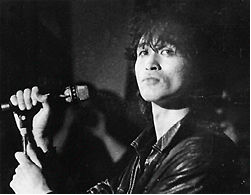
Viktor Zoi Viktor Robertovich Tsoi (June 21, 1962 – August 15, 1990) was a famous Soviet artist and leader of the rock group Kino. Tsoi was born to a Korean father and Russian mother on June 21, 1962 in Leningrad, USSR (now St. Petersburg, Russia). Tsoi's mother, Valentina Vasilyevna, was a teacher and his father, Robert Maximovich, was an engineer. He married Marianna Tsoi in 1985 and had a son with her--Alexander (Sasha). He is regarded as one of the pioneers of Russian rock and has a huge following in the countries of the former Soviet Union even today, as of 2008. Few musicians in the history of Russian music have been more popular or have had more impact on their genre than Victor Tsoi and his rock band Kino. After contributing a plethora of musical and artistic works, including ten albums, he died in a car accident when he fell asleep at the wheel on August 15, 1990. In 1982, Kino released their first album titled "45". This album first showed Tsoi's willingness to approach political topics in his music, something not too many other artists were willing to do. In his song Suburban Electric Train (Russian: Электричка/Elektrichka) he discussed a man stuck in a train that was taking him where he didn't wish to go; this was clearly a metaphor for life in the Soviet Union, and the band was quickly banned from performing this song live. Regardless, the political message of the song made it popular among the youth of the anti-establishment movement that now began to look to Victor Tsoi and "Kino" as their idols. "Kino" was still not getting much mainstream attention due to the lack of government support, that would all change with the arrival of Mikhail Gorbachev. Gorbachev came to power in 1985. His social and economic reforms, Glasnost and Perestroika, began exposing the social and economic problems of the Soviet Union and allowed open discussion of them in the media. People were beginning to realize that the Communist experiment was not working out and that things needed to change. Glasnost loosened the restrictions on the media and allowed rock bands to be written about and shown on television. In 1986 Tsoi used the open atmosphere and public sentiment to release a song titled [We're waiting for] Changes! (Russian: Перемен!/Peremen!). The song called on the young generation to demand changes within the current system and spread "Kino"'s name all over the nation. However, in an interview, aired on soviet TV shortly after his death, Tsoi claims that his songs often have been misinterpreted in the public and that he usually avoids political intentions in his poetry. In particular, Changes!, which was used widely for the perestroika movements, has nothing to do with it, he said. While in Latvia, on 14 August 1990, Tsoi finished recording the vocals for Kino's next album. He was supposed to travel back to Leningrad so that his band mates could record its musical score. Early in the morning of August 15th, Victor Tsoi was killed when he lost control of his Aleko car and slammed into a bus outside of Riga. The car was completely demolished to the point that one of its tires was never found. This all happened on the way back from a fishing trip. On August 17th, the Komsomolskaya Pravda, one of the main Soviet newspapers, had this to say about Tsoi and his meaning to the youth of the nation, Tsoi means more to the young people of our nation than any politician, celebrity or writer. This is because Tsoi never lied and never sold out. He was and remains himself. You can't not believe him... Tsoi is the only rocker who has no difference between his image and his real life, he lived the way he sang... Tsoi is the last hero of rock.


